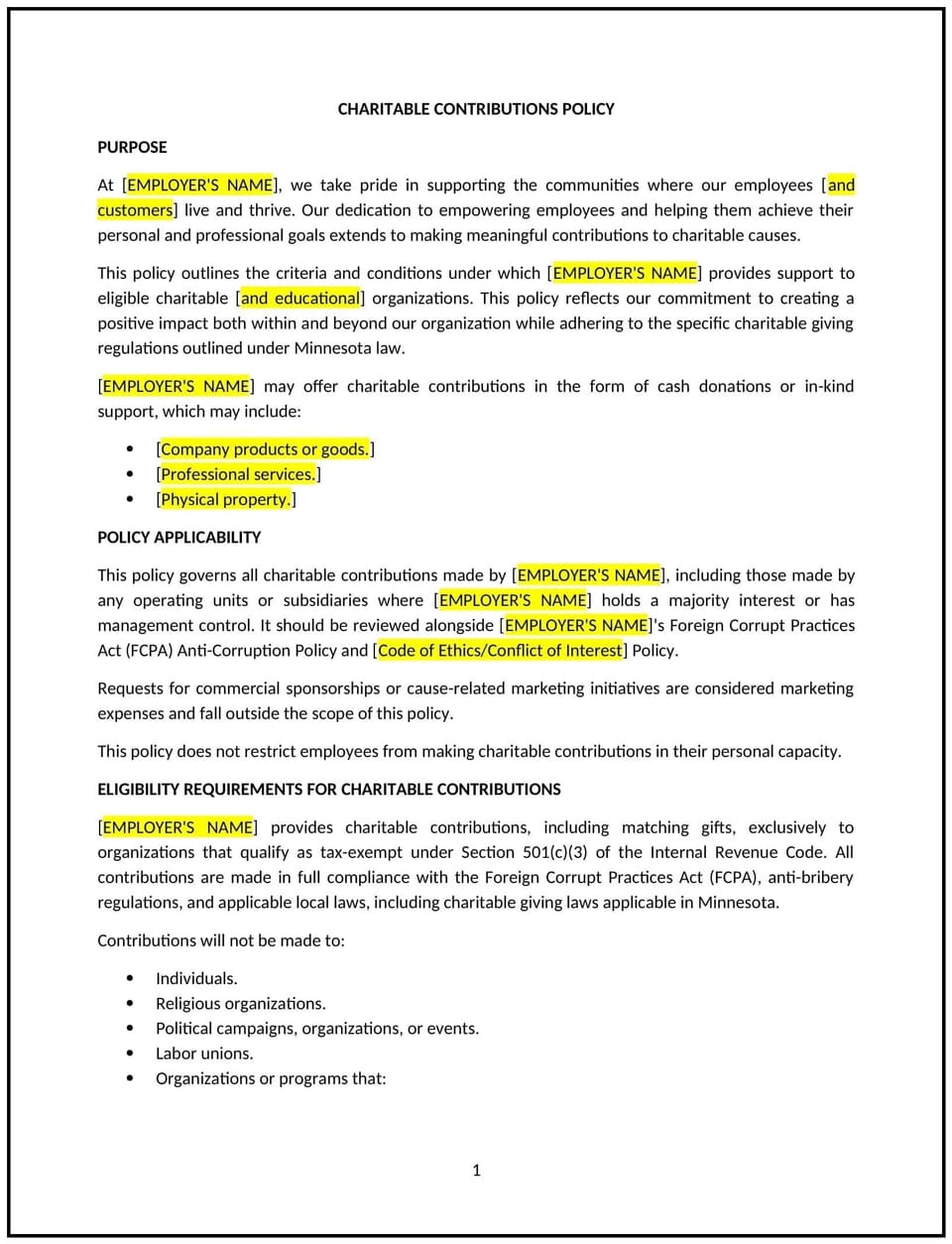Charitable contributions policy (Minnesota): Free template

Charitable contributions policy (Minnesota)
This charitable contributions policy is designed to help Minnesota businesses establish guidelines for making charitable donations and supporting community initiatives. It outlines procedures for approving contributions, the types of organizations eligible for support, and the responsibilities of both the business and employees.
By implementing this policy, businesses can contribute to their community, enhance their corporate social responsibility, and align company values with charitable giving.
How to use this charitable contributions policy (Minnesota)
- Define eligible charitable organizations: Specify which types of organizations are eligible for donations, such as nonprofits, schools, health organizations, and local community groups.
- Outline the approval process: Detail the process for requesting and approving charitable contributions, including required documentation or board approval, if necessary.
- Set donation limits: Clarify the maximum amount the company will contribute to any one cause or organization, and whether donations are a one-time event or part of an ongoing program.
- Promote employee involvement: Encourage employees to participate in charitable activities, either by organizing events, volunteering, or nominating organizations for contributions.
- Address matching gifts: If applicable, include provisions for matching employee donations to qualifying organizations and specify the process for submitting matching gift requests.
- Communicate transparency: Ensure that all contributions are documented and that employees can access information regarding the company’s charitable activities.
Benefits of using a charitable contributions policy (Minnesota)
Implementing this policy provides several advantages for Minnesota businesses:
- Enhances corporate reputation: Demonstrates the company’s commitment to community involvement and social responsibility.
- Engages employees: Encourages employee participation in charitable activities, which can boost morale and job satisfaction.
- Builds relationships: Strengthens connections with local organizations, customers, and the community.
- Provides tax benefits: Charitable contributions may be tax-deductible, offering financial benefits to the business.
- Reflects Minnesota-specific considerations: Adapts to local community needs, values, and charitable organizations within Minnesota.
Tips for using this charitable contributions policy (Minnesota)
- Communicate clearly: Make sure all employees are aware of the policy, how they can nominate organizations, and the process for receiving donations.
- Track donations: Maintain records of all charitable contributions made by the business to ensure transparency and accountability.
- Be strategic: Align charitable donations with the company’s values and the causes that resonate with both employees and customers.
- Encourage volunteerism: Consider supporting employees’ involvement in charitable activities by offering paid volunteer time or organizing group volunteering events.
- Review regularly: Reassess the policy periodically to ensure it aligns with evolving business goals, employee interests, and community needs.
Q: What types of organizations are eligible for charitable contributions?
A: Businesses should define the types of organizations eligible for donations, such as nonprofits, educational institutions, healthcare providers, and local community organizations, that align with the company’s values.
Q: How can employees nominate organizations for contributions?
A: Employees should submit a formal request or nomination to HR or the charitable contributions committee, providing the necessary details about the organization and why it should receive a donation.
Q: Are there limits to how much the company can donate to an organization?
A: Yes, businesses should set donation limits to manage their budget and ensure contributions are distributed fairly among various causes. The policy should specify whether donations are one-time gifts or can be made on an ongoing basis.
Q: Can employees receive matching contributions for their donations?
A: Yes, businesses can offer a matching gift program, where employee donations to qualifying organizations are matched by the company, subject to company approval and the guidelines of the matching gift program.
Q: How does the business track its charitable contributions?
A: Businesses should maintain records of all contributions, including donation amounts, recipients, and dates, and regularly report on the total contributions made to ensure transparency.
Q: What happens if a donation request is not approved?
A: Employees should be informed respectfully, and feedback may be provided regarding why the donation request did not meet the criteria outlined in the policy.
Q: How often should this policy be reviewed?
A: The policy should be reviewed annually or whenever there are changes to the business’s charitable giving strategies, budget, or Minnesota-specific considerations.
This article contains general legal information and does not contain legal advice. Cobrief is not a law firm or a substitute for an attorney or law firm. The law is complex and changes often. For legal advice, please ask a lawyer.


